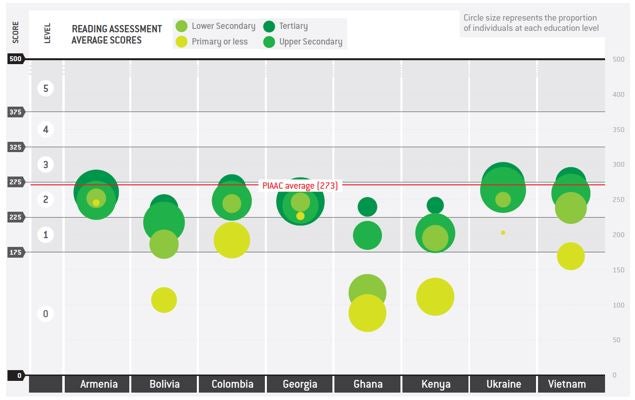
Education and training play an important role in ensuring that youth develop the skills they need to live independent and prosperous lives. The research is clear: youth are more affected by unemployment than any other age group. Around the globe we have seen the political, economic and social consequences of young people not having jobs. Governments and international development organizations have turned to education and training initiatives as one tool to enable youth to find jobs or launch their own businesses.
Data is fundamental in determining how education and training can develop the skills that the labor market needs and, as such, help youth find gainful employment. Our new skills data report presents a wide range of information in this regard, including data on how youth around the world develop skills, data on the kinds of skills they possess, and data on how they put their skills to use.
The report gives a glimpse into the ways in which the data from the STEP Skills Measurement Program can be used. It’s a compilation of more than 1,000 figures, charts, and graphs that use data from the Initiative’s household survey implemented in urban areas of 12 low and middle income countries. In this data report, we looked at the data through the lens of the educational attainment of two groups of people: youth (ages 15-24) and adults (ages 15-64).
The data report begins by covering the skills acquisition trajectory of individuals: their participation in early childhood education programs, their educational attainment by gender, and their participation in training and apprenticeship programs. It then explores background conditions associated with educational attainment, including their socioeconomic status, the educational attainment of their parents, their health conditions, and their overall satisfaction with life.
About half of the report is devoted to the use of cognitive skills (numeracy, reading and writing), as well as socio-emotional and job-relevant skills. In the final section, the report looks at several variables that indicate the status of individuals in the labor market.
All this information has been turned into user-friendly figures for you to see and use here.
Here are a couple of examples of what we found out from the STEP data we included in the report:
In most countries, adults with higher educational attainment have higher reading proficiency. In some cases, tertiary education graduates’ reading scores in the STEP sample countries resemble the average reading proficiency score of adults in OECD countries, which include many of the world’s advanced nations.



And those are only a few examples of the many topics you can explore through the STEP Program. You can also download the Excel file with the data behind these figures to perform your own analysis and create your own visuals. You will see that we have added a ‘bonus’ file where the 50+ variables covered in this publication are organized by reading proficiency.
For those of you who want to look at the raw data files, a set of STATA ready files are one click away.
We hope that you take advantage of this rich data to continue working towards improving the chances of youth (and all) for better skills, better jobs and better lives. Spread the word so others can use it, too. Enjoy!
See our skills development website .
Find out more about the World Bank Group’s work on education on Twitter and Flipboard.



Join the Conversation